It's the fourth and final day of the Nederlands Silent Film Festival (NSFF). On the programme this afternoon is The Kid (1921), one of the greatest films of the silent era. The comedy-drama was written, produced and directed by Charlie Chaplin. He also stars in it with Jackie Coogan as his adopted son and sidekick. Chaplin's first full-length film as a director was a huge success and was the second-highest-grossing film in 1921.
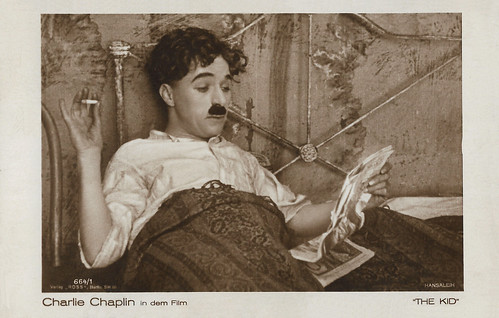
German postcard by Ross Verlag, no. 664/1. Photo: Hansaleih. Charlie Chaplin in The Kid (Charles Chaplin, 1921).
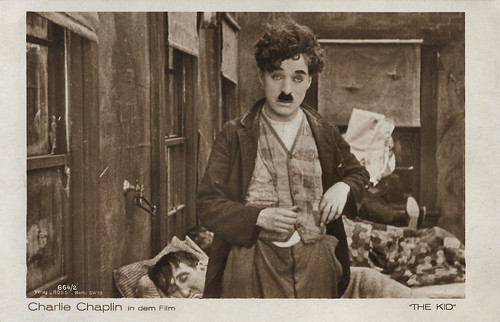
German postcard by Ross Verlag, no. 664/2. Photo: Hansaleih. Publicity still for The Kid (Charles Chaplin, 1921) with Charlie Chaplin.
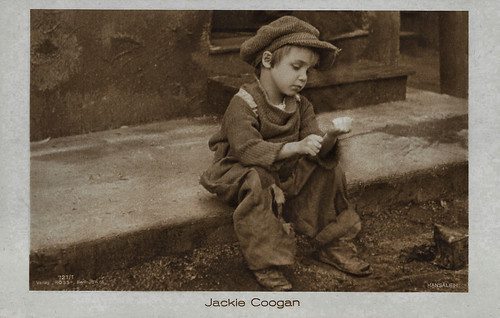
German postcard by Ross Verlag, no. 721/1. Photo: Hansaleih. Publicity still for The Kid (Charles Chaplin, 1921) with Jackie Coogan.

German postcard by Ross Verlag, no. 721/2. Photo: Hansaleih. Publicity still for The Kid (Charles Chaplin, 1921) with Jackie Coogan.
The Kid (Charles Chaplin, 1921) starts off with inter-titles, "A picture with a smile - and perhaps a tear," followed by "The woman whose sin was motherhood". An unknown woman (Edna Purviance) leaves a charity hospital carrying her newborn son. An artist (Carl Miller), the apparent father, is shown in the woman's photograph. When it falls into the fireplace, he first picks it up and then throws it back in to burn up. The woman decides to abandon her child in the back seat of an expensive automobile with a handwritten note imploring the finder to care for and love the baby. However, the car is stolen. When the two thieves discover the child, they dump him in a garbage can on the street.
The Tramp (Charlie Chaplin) notices the baby wrapped in a blanket. First, Charlie tries to pass it off to someone else, but after stumbling upon a note which reads, "Please love and care for this orphan child", he decides to raise the child himself. He names the boy John. Elsewhere, the woman has an apparent change of heart and returns for the baby, but is heartbroken and faints upon learning of the baby having been taken away.
Five years pass, and the child (Jackie Coogan) becomes the Tramp's partner in a minor crime, throwing stones to break windows that the Tramp, working as a glazier, can then repair. Meanwhile, the woman becomes a wealthy opera star. She spends her spare time with charitable work handing out gifts to the children of poor districts to fill the void left by her missing child. By chance, the paths of the kid and his mother meet numerous times, unaware of each other's identities.
When the boy becomes seriously ill, a middle-aged country doctor comes to see him. He discovers that the Tramp is not the boy's father. The Tramp shows him the note left by the mother, but the doctor merely takes it and notifies the authorities of the County Orphan Asylum to take the child away. Two men take the boy to the orphanage, but after a fight and a chase, the Tramp steals the boy back just before he arrives at the Orphan Asylum. When the woman returns to see how the boy is doing, the doctor tells her what has happened, and then shows her the note, which she recognises.
Now fugitives, the Tramp and the boy spend the night in a flophouse, but the manager (Henry Bergman), having read of the $1,000 reward offered for the child, takes him to the police station to be united with his ecstatic mother. When the Tramp wakes up, he searches frantically for the missing boy, then returns to doze beside the now-locked doorway to their humble home. In his sleep, he enters 'Dreamland', with angels in residence and devilish interlopers. He is awakened by a kind policeman (Tom Wilson), who places the Tramp in a car and rides with him to a mansion. When the door opens, the woman and John emerge, reuniting the elated adoptive father and son. The policeman, who is happy for the family, shakes the Tramp's hand and leaves before the woman welcomes the Tramp into her home.
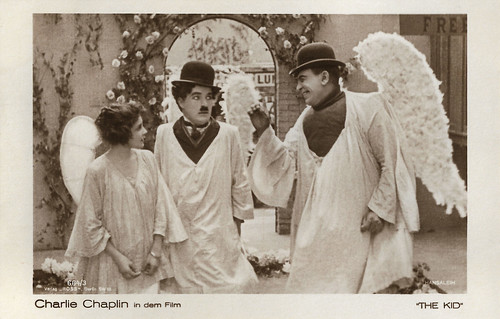
German postcard by Ross Verlag, no. 664/3. Photo: Hansaleih. Publicity still for The Kid (Charles Chaplin, 1921) with Charlie Chaplin, Lita Grey and Charles Reisner.
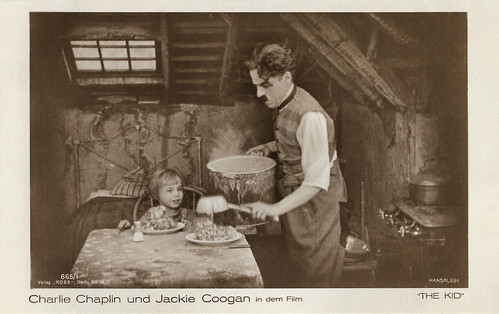
German postcard by Ross Verlag, no. 665/1. Photo: Hansaleih. Publicity still for The Kid (Charles Chaplin, 1921) with Charlie Chaplin and Jackie Coogan.
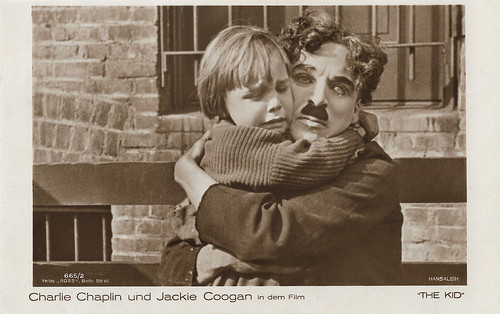
German postcard by Ross Verlag, no. 665/2. Photo: Hansaleih. Publicity still for The Kid (Charles Chaplin, 1921) with Charlie Chaplin and Jackie Coogan.
The Kid (Charles Chaplin, 1921) is notable for combining comedy and drama. As the opening title says: "A picture with a smile—and perhaps, a tear". The most famous and enduring sequence in the film is the Tramp's desperate rooftop pursuit of the agents from the orphanage who had taken the child and their emotional reunion. The film made Jackie Coogan, then a vaudeville performer, the first major child star of the cinema. Many of the Chaplin biographers have attributed the relationship portrayed in the film to have resulted from the death of Chaplin's firstborn infant son just ten days before the production began.
J. Spurlin at IMDb: "Jackie Coogan (about five in this film), with his charming manners, his talents as a mimic and his adeptness at physical comedy, is one of the all-time great child actors. Want more evidence of Chaplin's genius? Coogan doesn't steal the film from him. This is true even though Chaplin, as producer, star and director, makes every evident attempt to spotlight the boy's talents. Coogan is even better here than he is in his own vehicles, like My Boy and Oliver Twist."
The portrayal of poverty and the cruelty of welfare workers are also directly reminiscent of Chaplin's own childhood in London. Several of the street scenes were filmed on Los Angeles's famed Olvera Street, almost 10 years before it was converted into a Mexican-themed tourist attraction.
Another IMDb reviewer, Lugonian, notes: "Chaplin, who constructs his gags to perfection, has one difficult scene that comes off naturally, this being where Charlie cuts out diapers from a sheet for the infant as he's lying beside him in a miniature hammock crying out for his milk. The baby immediately stops after Charlie directs the nipple attached to a coffee pot (a substitute for a baby bottle) back into his mouth. Another classic moment, of a serious nature, is when Charlie is being held back by authorities, being forced to watch his crying 'son' taken away from him. Charlie breaks away and goes after the truck as he's being chased by a policeman from the slanted rooftops. The close-up where father and son tearful reunite is as touching as anything ever captured on film."
After production was completed in 1920, the film was caught up in the divorce actions of Chaplin's first wife Mildred Harris, who sought to attach Chaplin's assets. Chaplin and his associates smuggled the raw negative to Salt Lake City, reportedly packed in coffee cans, and edited the film in a room at the Hotel Utah. Before releasing the film Charlie Chaplin negotiated for and received an enhanced financial deal for the film with his distributor, First National Corporation, based on the success of the final film. Twelve-year-old Lita Grey, who portrays an angel in the film, would become Chaplin's second wife from 1924 to 1927. In 1971, Charles Chaplin edited and reissued the film and he composed a new musical score.
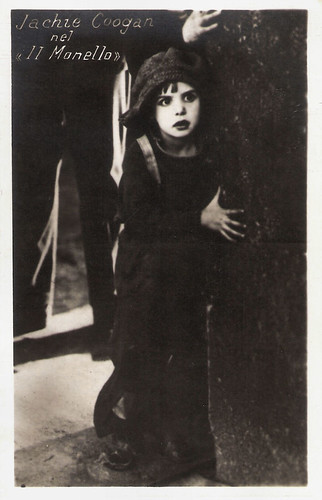
Italian postcard. Photo: publicity still for The Kid (Charles Chaplin, 1921) with Jackie Coogan.
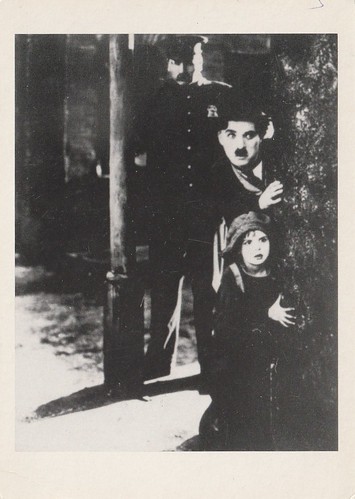
Postcard by Palm Pictures, no. C 23. Photo: publicity still for The Kid (Charles Chaplin, 1921) with Charlie Chaplin and Jackie Coogan. Collection: Daniël van der Aa. Tom Wilson is probably the cop in the background.
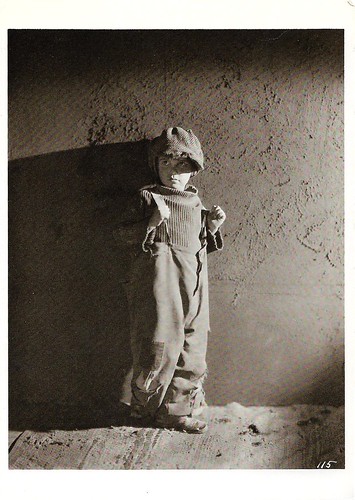
Jackie Coogan. Modern American postcard by Fotofolio. Photo: James Abbe, 1921.

French postcard by Editions La Malibran, Paris, 1991, no. CA 82. Photo: Bubbles Inc. Charlie Chaplin in The Kid (Charles Chaplin, 1921).
Sources: J. Spurlin (IMDb), Lugonian (IMDb), Wikipedia and IMDb.

German postcard by Ross Verlag, no. 664/1. Photo: Hansaleih. Charlie Chaplin in The Kid (Charles Chaplin, 1921).

German postcard by Ross Verlag, no. 664/2. Photo: Hansaleih. Publicity still for The Kid (Charles Chaplin, 1921) with Charlie Chaplin.

German postcard by Ross Verlag, no. 721/1. Photo: Hansaleih. Publicity still for The Kid (Charles Chaplin, 1921) with Jackie Coogan.

German postcard by Ross Verlag, no. 721/2. Photo: Hansaleih. Publicity still for The Kid (Charles Chaplin, 1921) with Jackie Coogan.
Abandoned in the back seat of an expensive automobile
The Kid (Charles Chaplin, 1921) starts off with inter-titles, "A picture with a smile - and perhaps a tear," followed by "The woman whose sin was motherhood". An unknown woman (Edna Purviance) leaves a charity hospital carrying her newborn son. An artist (Carl Miller), the apparent father, is shown in the woman's photograph. When it falls into the fireplace, he first picks it up and then throws it back in to burn up. The woman decides to abandon her child in the back seat of an expensive automobile with a handwritten note imploring the finder to care for and love the baby. However, the car is stolen. When the two thieves discover the child, they dump him in a garbage can on the street.
The Tramp (Charlie Chaplin) notices the baby wrapped in a blanket. First, Charlie tries to pass it off to someone else, but after stumbling upon a note which reads, "Please love and care for this orphan child", he decides to raise the child himself. He names the boy John. Elsewhere, the woman has an apparent change of heart and returns for the baby, but is heartbroken and faints upon learning of the baby having been taken away.
Five years pass, and the child (Jackie Coogan) becomes the Tramp's partner in a minor crime, throwing stones to break windows that the Tramp, working as a glazier, can then repair. Meanwhile, the woman becomes a wealthy opera star. She spends her spare time with charitable work handing out gifts to the children of poor districts to fill the void left by her missing child. By chance, the paths of the kid and his mother meet numerous times, unaware of each other's identities.
When the boy becomes seriously ill, a middle-aged country doctor comes to see him. He discovers that the Tramp is not the boy's father. The Tramp shows him the note left by the mother, but the doctor merely takes it and notifies the authorities of the County Orphan Asylum to take the child away. Two men take the boy to the orphanage, but after a fight and a chase, the Tramp steals the boy back just before he arrives at the Orphan Asylum. When the woman returns to see how the boy is doing, the doctor tells her what has happened, and then shows her the note, which she recognises.
Now fugitives, the Tramp and the boy spend the night in a flophouse, but the manager (Henry Bergman), having read of the $1,000 reward offered for the child, takes him to the police station to be united with his ecstatic mother. When the Tramp wakes up, he searches frantically for the missing boy, then returns to doze beside the now-locked doorway to their humble home. In his sleep, he enters 'Dreamland', with angels in residence and devilish interlopers. He is awakened by a kind policeman (Tom Wilson), who places the Tramp in a car and rides with him to a mansion. When the door opens, the woman and John emerge, reuniting the elated adoptive father and son. The policeman, who is happy for the family, shakes the Tramp's hand and leaves before the woman welcomes the Tramp into her home.

German postcard by Ross Verlag, no. 664/3. Photo: Hansaleih. Publicity still for The Kid (Charles Chaplin, 1921) with Charlie Chaplin, Lita Grey and Charles Reisner.

German postcard by Ross Verlag, no. 665/1. Photo: Hansaleih. Publicity still for The Kid (Charles Chaplin, 1921) with Charlie Chaplin and Jackie Coogan.

German postcard by Ross Verlag, no. 665/2. Photo: Hansaleih. Publicity still for The Kid (Charles Chaplin, 1921) with Charlie Chaplin and Jackie Coogan.
The first major child star of the cinema
The Kid (Charles Chaplin, 1921) is notable for combining comedy and drama. As the opening title says: "A picture with a smile—and perhaps, a tear". The most famous and enduring sequence in the film is the Tramp's desperate rooftop pursuit of the agents from the orphanage who had taken the child and their emotional reunion. The film made Jackie Coogan, then a vaudeville performer, the first major child star of the cinema. Many of the Chaplin biographers have attributed the relationship portrayed in the film to have resulted from the death of Chaplin's firstborn infant son just ten days before the production began.
J. Spurlin at IMDb: "Jackie Coogan (about five in this film), with his charming manners, his talents as a mimic and his adeptness at physical comedy, is one of the all-time great child actors. Want more evidence of Chaplin's genius? Coogan doesn't steal the film from him. This is true even though Chaplin, as producer, star and director, makes every evident attempt to spotlight the boy's talents. Coogan is even better here than he is in his own vehicles, like My Boy and Oliver Twist."
The portrayal of poverty and the cruelty of welfare workers are also directly reminiscent of Chaplin's own childhood in London. Several of the street scenes were filmed on Los Angeles's famed Olvera Street, almost 10 years before it was converted into a Mexican-themed tourist attraction.
Another IMDb reviewer, Lugonian, notes: "Chaplin, who constructs his gags to perfection, has one difficult scene that comes off naturally, this being where Charlie cuts out diapers from a sheet for the infant as he's lying beside him in a miniature hammock crying out for his milk. The baby immediately stops after Charlie directs the nipple attached to a coffee pot (a substitute for a baby bottle) back into his mouth. Another classic moment, of a serious nature, is when Charlie is being held back by authorities, being forced to watch his crying 'son' taken away from him. Charlie breaks away and goes after the truck as he's being chased by a policeman from the slanted rooftops. The close-up where father and son tearful reunite is as touching as anything ever captured on film."
After production was completed in 1920, the film was caught up in the divorce actions of Chaplin's first wife Mildred Harris, who sought to attach Chaplin's assets. Chaplin and his associates smuggled the raw negative to Salt Lake City, reportedly packed in coffee cans, and edited the film in a room at the Hotel Utah. Before releasing the film Charlie Chaplin negotiated for and received an enhanced financial deal for the film with his distributor, First National Corporation, based on the success of the final film. Twelve-year-old Lita Grey, who portrays an angel in the film, would become Chaplin's second wife from 1924 to 1927. In 1971, Charles Chaplin edited and reissued the film and he composed a new musical score.

Italian postcard. Photo: publicity still for The Kid (Charles Chaplin, 1921) with Jackie Coogan.

Postcard by Palm Pictures, no. C 23. Photo: publicity still for The Kid (Charles Chaplin, 1921) with Charlie Chaplin and Jackie Coogan. Collection: Daniël van der Aa. Tom Wilson is probably the cop in the background.

Jackie Coogan. Modern American postcard by Fotofolio. Photo: James Abbe, 1921.

French postcard by Editions La Malibran, Paris, 1991, no. CA 82. Photo: Bubbles Inc. Charlie Chaplin in The Kid (Charles Chaplin, 1921).
Sources: J. Spurlin (IMDb), Lugonian (IMDb), Wikipedia and IMDb.
No comments:
Post a Comment